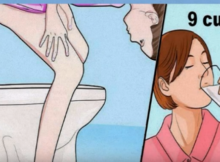Human body is about 70% water, which means it needs sufficient amount of water to carry out its functions properly. Both muscle and kidney tissues are mostly water as well. Your blood is 83% water, your lungs are astonishing 90% water, and your brain is 76% water.
The body loses water through breathing, sweating and urinating, so providing sufficient amounts of water is of essential importance. Experts suggest that we drink 6-8 glasses of water on a daily basis, but most people usually stick to 2 cups in average.
Men should drink up to 3 liters of water, or 12 cups, and women are advised to drink 2.2 liters of water, or 9 cups. These amounts are essential for optimal hydration. Insufficient water intake causes mild dehydration which manifests through various symptoms.
- Dark urine
It is the first indicator to tell you that you do not drink enough water. Urine of healthy organism is light yellow. If you do not take your water seriously, your kidneys excrete a higher concentration of waste products in the urine, including dead blood cells, toxins, proteins and other products that need to be removed from the body, which is why your urine is dark.
Urine changes its color as a result of certain drugs, B vitamins, beets, blackberries, asparagus, food coloring and other the like. If the changes are temporary, you are likely to have consumed something that has altered your urine color. D
rink plenty of water to determine whether the color of your urine becomes lighter. It your urine color is still dark, you may be dealing with a severe health condition like hepatitis or even gallstones.
- Reduced urination
A healthy person urinates 6-7 times within 24 hours. But, if you do not drink proper amounts of water, the body cannot replace the fluids it has lost. Your kidneys try to keep as much water as possible to prevent the body from dehydrating.
If you go to the toilet less than 6 times a day, make sure you increase your water intake, and observe your overall health condition.
- Constipation
It is a common sign of dehydration, and usually an increased water intake solves the problem. When you do not drink enough water, the body will draw out water from every tissue, including the colon.
If your large intestine is well hydrated, your stool should be soft and easy-to-pass. Water deficiency results in harder stools.
Make sure you drink plenty of water, and eat more fiber-rich foods. Constipation is also caused by lack of physical activity, hypothyroidism, inflammation of the intestines and dysbiosis, food sensitivity and stress. If you drink enough water and still deal with constipation, check for any other causes.
- Dry and wrinkled skin
Most women spend a small fortune on good moisturizers that promise a soft and smooth skin. Some go for expensive treatments that are supposed to free them from fine lines and wrinkles.
Others drink plenty of water. Dr Diana Howard says that dehydration is a contributing factor to irritated, inflamed, itching or sensitive skin. Sometimes skin becomes flaky and scaly, and in more severe cases it is all red, bleeding and filled with cracks.
When the skin lacks moisture, its cells shrivel, which makes the wrinkles more defined and you look older. So, consider replenishing your skin with plenty of filtered water.
- Hunger and weight gain
Human body is a brilliant and smart machine, but it cannot make a difference between thirst and hunger. How weird is that?
The hypothalamus regulates both hunger and thirst, but it is often confused so you think you are hungry instead of thirsty. So, if you eat something instead of drinking a glass of water, you eat more calories, and thus gain weight like crazy.
Maintain a healthy weight and drink proper amounts of water. Next time you feel hungry, take a glass of water before you reach for your favorite snack. If you are still hungry after 15 minutes, make yourself a nice dish.
- Thirst and dry mouth
Thirst is a great indicator that your body already lacks water. Dry mouth is a common sign that you are thirsty, and your mucus membranes scream for water. So, sip some water throughout the entire day.
- Headache
As we already explained, when you do not drink enough water, the body absorbs water from its tissues in an attempt to preserve as much water as it can.
It also draws the moisture from your brain tissue, making it shrink and pulling it away from the skull. This triggers the pain receptors, and you experience a severe headache.
Insufficient water intake affects your blood volume, and thus reduces the oxygen flow to the brain. Blood vessels in your brain start dilating and lead to swelling and inflammation, which makes the headache even more severe.






